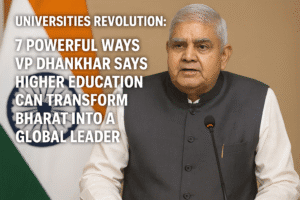Universities Revolution: 7 Powerful Ways VP Dhankhar Says Higher Education Can Transform Bharat into a Global Leader
Vice President Jagdeep Dhankhar paid tribute to Dr. Syama Prasad Mookerjee on his Balidan Diwas, crediting his “Ek Vidhan, Ek Nishan, Ek Pradhan” vision as foundational to India’s unity and linking it to the transformative abrogation of Article 370. Addressing Vice Chancellors, he championed the NEP 2020 as India’s civilizational commitment to education as “self-awakening” rather than mere skill-building. Dhankhar passionately framed education as democracy’s “great equalizer” that dismantles inequities.
He challenged universities to transcend being “degree factories” and instead become “sanctuaries of ideas” and “crucibles of innovation,” fostering essential debate and dissent. Critiquing regional educational imbalances, he urged “greenfield institutions” for equitable access while warning against commercialization. Positioning India as the emerging “knowledge epicenter,” he called for “uncompromising excellence” in AI, climate tech, and quantum science, declaring such leadership a strategic imperative where “Bharat will lead, others follow.” He concluded by urging universities to prepare minds for “impossible choices” that define national character.

Universities Revolution: 7 Powerful Ways VP Dhankhar Says Higher Education Can Transform Bharat into a Global Leader
Vice President Jagdeep Dhankhar delivered a powerful address at the 99th Annual Meet of Vice Chancellors, weaving together tributes to history, reflections on national integration, and an urgent call for transforming India’s higher education landscape. His speech, rich in substance and vision, offered more than platitudes – it presented a roadmap for universities as fundamental pillars of democracy and progress.
Honouring a Unifier’s Legacy
Opening on a poignant note, the VP paid homage to Dr. Syama Prasad Mookerjee on his Balidan Diwas (Sacrifice Day). He powerfully recalled Dr. Mookerjee’s resounding call for national unity: “Ek Vidhan, Ek Nishan, Ek Pradhan” (One Constitution, One Symbol, One Leader). Dhankhar explicitly linked this historical struggle to the recent resolution of a long-standing challenge:
“We suffered from Article 370 for too long. It bled us and the state of Jammu and Kashmir. Article 370 and the draconian Article 35A deprived people of their basic human rights and fundamental rights.” He hailed the abrogation on August 5, 2019, and the subsequent Supreme Court validation (December 11, 2023) as the fulfilment of Dr. Mookerjee’s vision, crediting Prime Minister Narendra Modi and Home Minister Amit Shah.
NEP 2020: Awakening the Self, Not Just Building Skills
Shifting focus to education, Dhankhar heralded the National Education Policy (NEP) 2020 as a transformative force shaping India’s future. He emphasized its deep alignment with India’s civilizational ethos: “The policy resonates with our civilizational spirit, essence, and ethos. It is a bold reaffirmation of India’s timeless belief that education is the awakening of the self — not just for education of skills.” This shift, he argued, moves beyond mere vocational training towards holistic personal and intellectual development.
Education: The Great Democratizer
The VP articulated a profound conviction about education’s societal role: “Education is a great equalizer. Education brings about equality as no other mechanism does. Education decimates inequities. As a matter of fact, education gives life to democracy.” This framing elevates education from an individual pursuit to the bedrock of a functioning, equitable democratic society.
The University Imperative: Beyond Degree Factories
Dhankhar issued a direct challenge to university leaders: “Our universities are not meant to just hand out degrees. The degrees must carry great weightage. Universities must be sanctuaries of ideas and ideation, crucibles of innovation. These places have to catalyse big change.” He stressed that Vice Chancellors bear significant responsibility in fostering environments that are:
- Hubs of Critical Thought: “There must be space for disagreement, debate, dialogue and discussion… Abhivyakti (Expression), Vaad Vivaad (Debate), Anant Vaad (Continuous Discourse) — these are inalienable facets of our civilisation, of our democracy.” He argued this intellectual friction is essential for activating minds and driving progress.
- Engines of Equitable Access: Critiquing the concentration of elite institutions in metros and Tier-1 cities (“clusterization”), the VP advocated for “greenfield institutions” in underserved regions. He stressed that equitable distribution is crucial for truly democratizing quality education. He reminded VCs they are “impregnable bulwarks against commodification and commercialisation of education,” with a core mission to ensure affordability, reach, and accessibility.
Bharat’s Call to Lead: Building Institutions of “Uncompromising Excellence”
Looking to the future, Dhankhar positioned India uniquely: “India has emerged as a land of opportunity, of entrepreneurship, of startups, of innovation, of unicorns… We cannot remain perpetual students of Western innovation when our demographic dividend position says, as the world’s knowledge epicenter.” He urged bold action:
“Establish institutions of uncompromising excellence in emerging domains — artificial intelligence, climate change, climate technology, quantum science, digital ethics — then Bharat will lead, others will follow.”
He elevated education to the status of a “strategic national asset,” intrinsically linked not only to infrastructure and development but crucially to national security.
The Challenge of “Impossible Choices”
Concluding with a resonant thought for academics, Dhankhar stated: “Impossible choices define our character and strength… Taking the easy path is getting into mediocrity, and then into irrelevance and insignificance.” He framed universities as the “crucibles” where individuals are prepared to make these tough choices and become intrepid leaders.
Uttar Pradesh: A Case Study in Initiative
The VP commended the Uttar Pradesh government, particularly noting its grant of “Industry Status” to the IT sector and improvements in transparency and accountability within school education administration as positive models.
The Path Forward
VP Dhankhar’s address was a potent blend of historical reflection, contemporary policy affirmation (NEP 2020, Article 370 abrogation), and a future-focused challenge. His core message is clear: Indian universities must transcend their traditional roles. They are not merely degree-granting bodies but vital sanctuaries of ideas, engines of equitable opportunity, and crucibles for developing the intellectual leadership needed to tackle “impossible choices” and position Bharat as a global knowledge leader in the defining fields of the 21st century.
The responsibility rests heavily on Vice Chancellors to safeguard these ideals and drive this transformation.
You must be logged in to post a comment.